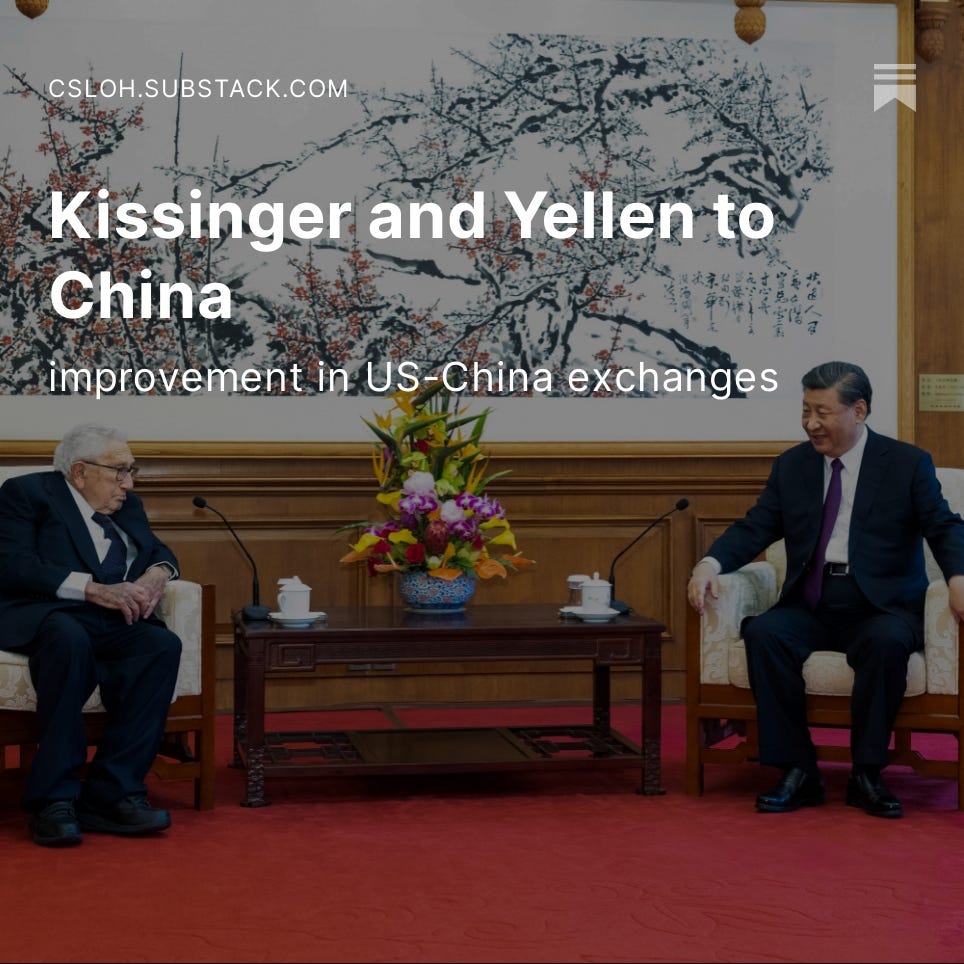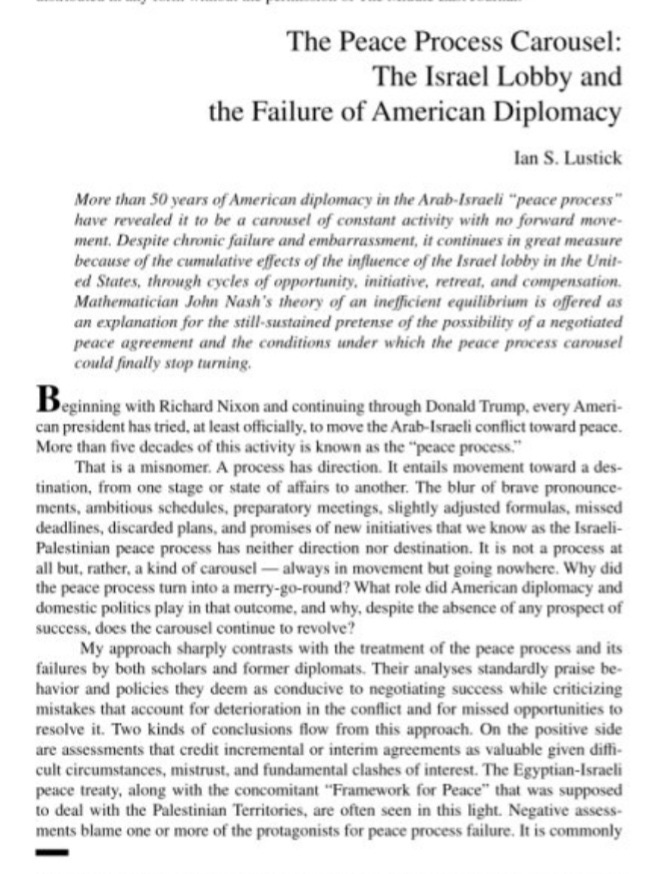#22 GEOECONOMICS GEOPOLITICS
Kissinger in China; China in Islamic World; New Middle East; Gazafication; Africa economic system; unity in mutiny; political economy of MADANI
Here are expanded commentaries on the essays posted TWTW:
1] KISSINGER AND YELLEN TO CHINA
Kissinger meeting with Xi would not much erase, less of all eradicate, a perception on America sole hegemonic intent in the Asia-Pacific Basin.
Former Ambassador Robert Blackwell and Ashley Tellis, writing for the Council on Foreign Relations in March 2015, had already laid out the American plan of what’s happening right now is pretty much what is happening in present US-China relations. The deterioration of relations was planned — it’s not ad hoc. First, “Since its founding, the United States has consistently pursued a grand strategy focused on acquiring and maintaining preeminent power over various rivals. First on the North American continent, then in the Western Hemisphere, and finally, globally”, (see Brzezinsk's Mad Imperial Strategy). Further, they had argued that “preserving U.S. primacy in the global system ought to remain the central objective of U.S. grand strategy in the 21st century.”
American-NATO proxy war in the Russia's cross-border special military operation is one such hegemonic aspect in holding on, and domination in, the Eurasian hinterland; read also Amanda Yee, The Containment and Encirclement of China.
Now that to leave Ukraine, after all the created mayhems, Who Can Give Security Guarantees To Ukraine? (moon of alabama). At best, the U.S. military support at current historic levels has won Kyiv a military stalemate.Ukraine, certainly out of NATO and arguably even as a member, will never enjoy an Israeli-style Quality Military Edge (QME) over Moscow, or be able to command the region’s strategic or security agenda as Israel has done in the Middle East.
Russia's might even makes an attempt of an Israel like security guarantee for Ukraine too costly for the U.S. and thereby simply impossible. Likely then, an end game resolution with an armistice or at worst a Polish revanchism, thus said Bhadrakumar.
[And, Australia has been an accessory or is a USA vassal for far too long - in Vietnam, Iraq and Afghanistan. Maybe, time for Australia to reassess its moral compass; after all, the blinkened promoter of the Indo-Asia-Pacific Strategy, in Brisbane last Saturday, the US secretary of state Antony Blinken had rebuked prime minister Anthony Albanese’s attempts to secure the release of Wikileaks founder Julian Assange, who is languishing in Belmarsh Prison, United Kingdom; it's the day Australian sovereignty died (dissent voice 1/08/23); including its sycophantic press, Caitlin Johnstone)].
Whilst one could say that the only important achievement of Yellen's visit to China has been the confirmation that China and the United States are willing to, and should, work together to safeguard global financial stability. Looking broadly, factually speaking [实事求是地说], the maintenance of global financial stability may well be the greatest common interest in the US-China relationship today.
Even then, it seems that the two nations are talking past each other, (Alex Lo, 27/07/23). Besides, China regards the United States’ economic–technological sanctions, such as the microchips ban and export limits that deliberately restrict China’s modernisation, as the hallmark of unhealthy competition, (HY Toh, eastasia forum)
In another part of the world not too long ago.
2] CHINA AND THE ISLAMIC WORLD
A piece of good tapestry on the Islamic landscape and the associated Middle East relationships can also be perused in The Middle East Journal
The present Middle East cultural and commercial exchanges emphasis on the mutual benefits of cooperation with China advancing the “community of common destiny for mankind” (人类命运共同体), which is a key concept in Chinese foreign policy on “enlarging the cake” of modernization (共同做大人类社会现代化的"蛋糕"), that shall divide and be shared equitably.
Typically, this specific articulation is often tagged to the Global Development Initiative (全球发展倡议), the Global Security Initiative (全球安全倡议), and the Global Civilization Initiative (全球文明倡议).
It all started in September 2013 President Xi Jinping in a speech at Nazarbayev University in Kazakhstan by proposing the creation of a New Silk Road Economic Belt stretching from western China across Central Asia. A few weeks later, in his address to Indonesia’s parliament, Xi called for the development of a Maritime Silk Road aimed at expanding maritime connections and cooperation between China and Southeast Asia.
In China, Islam, and New Visions of the Old World,
Robert R. Bianchi says that China is steadily reshaping the world’s political and economic landscape by connecting Europe and the Pacific through a series of transcontinental and transoceanic networks that will run across the major Islamic countries of Asia and Africa.
As a region long dominated by Western colonialism, imperialism, and hegemony, the Middle East is experiencing a significant shift in its political orientation and foreign policy choices by actively seeking to return 回归 to Asia.
In essence, the decline of Western influence in the Middle East and the return of the Middle East to Asia are the result of profound changes in East-West relations as the world undergoes great changes unseen in a century. It is a reflection that the West's hard and soft power in the region have both declined.
On the other hand, Middle East's return to Asia presents a challenge to China's political 0geography, regional studies, and overall planning 统筹 of her foreign policy.
The article lays out the trajectory options available.
4] GAZAFICATION of the WEST BANK
More than 50 years of American diplomacy in the Arab-Israeli “peace process” have revealed it to be a carousel of constant activity with no forward movement. Despite chronic failure and embarrassment, it continues in great measure because of the cumulative effects of the influence of the Israel lobby in the United States, through cycles of opportunity, initiative, retreat, and compensation - all to the total disregard of Palestinians’ pride and their plights: from statehood to daily livelihood.
On the other hand, instead of relying on the Israeli lobby (Lustick, 2020), China is seemingly seen to adopt the Middle East as an extension of China’s periphery. The significance is clear to some China-watchers whereby President Xi Jinping’s fen fa you wei approach to international politics (that is, “be proactive in seeking achievements”) was first articulated in a meeting on China’s peripheral diplomacy. If the Middle East is indeed a part of this periphery, an increasingly proactive approach to the region will even become clearer in months ahead, after the conclusion of the Saudi-Iranian mediation role.
That the Chinese were able to execute the Saudi-Iran rapprochement is due in not small part by restructuring their Ministry of Foreign Affairs various divisions:
As the result of reforms enacted in 2018, including the upgrade of the Central Foreign Affairs Leading Small Group into the Central Foreign Affairs Commission and, reportedly, greater authority given to Chinese ambassadors abroad over officials from other ministries and state-owned companies, (bloomberg, 28/02/2918).
Even Ambassador Chas Freeman has provided a scathing account of Washington’s Middle East policy.
Michael Singh has stressed the economics dimension instead of leadership tending to propose and then fail to rebalance American foreign policy from over-reliance on the military toward greater use of diplomacy and economic tools of statecraft, (John R. Deni, “Obama’s Failure to Demilitarize U.S. Foreign Policy,” War on the Rocks, October 20, 2015).
Historically, following the Bandung Conference in 1955, the People’s Republic of China (PRC) espoused ― in an unusual contrast with other major powers of the “socialist” and “nonaligned” camps ― a pro-Palestinian stance in its foreign policy toward the Middle East. This did not entail, however, any direct contact with the Palestinians, a development that did not appear until the mid-1960s emergence of a more autonomous and coherent Palestinian national movement embodied in the PLO.
Contact prior to the establishment of formal channels of communication took place through a number of unofficial and semi-official conduits, ranging from the Algerian National Liberation Front (FLN), the Chinese embassies in Egypt and South Yemen after 1967, and the “underground” Communist networks (mainly Iraqi, Sudanese, and Yemeni) to such bodies as the Chinese Committee for Afro-Asian Solidarity and the Chinese People’s Association for Friendship with Foreign Countries. These contacts enabled the PRC to eventually extend formal diplomatic recognition of the PLO in 1964, making it the first non-Arab country to do so.
Concurrently, through thorough planning and execution of policies, China has emerged gradually, but grandly, on the MENA arena admirably:
For example: Xi, Guigui, and Shuisheng Chen, “China’s Economic Diplomacy in the Middle East within the Framework of the Belt and Road Initiative,” Arab World Studies 6 (2016): 48–59 + 117 [in Chinese].
Min Wei, “Theory and Policy Analysis of Sino-Middle Eastern Production Cooperation,” Arab World Studies 6 (2016): 3–20 + 116 [in Chinese].
Ministry of Foreign Affairs of the People’s Republic of China, “Report summarizes key points in Sino-Arab ties,” December 3, 2022.
Xinchun Niu, “China’s Middle East Strategy within the Framework of the Belt and Road Initiative,” Foreign Affairs Review 34, 4 (2017): 32–58 [in Chinese]
And, in the ChinaMed Project. “ChinaMed Observer - China Looks at the Mediterranean Region November 2022,” December 17, 2022. .
5] AFREXINSURE
After centuries of exploitation on natural and human resources by western colonialists (read GEOECONOMICS #21, Africa road to Socialism), the African peoples’ struggle against neoimperialism is another united struggle towards economic independence from the West by launching an insurance system that will allow them to conduct inter-state trade without the involvement of the US dollar or other Western currencies.
6] UNITY in MUTINY
Continuing the “North-South Dialogue,” debates of the 1970s that set out to restructure the relationships between liberated nations of the South and their former colonizers in the North, now is the time whenever we can get the mutiny of the North to lend a hand to the mutiny of the South, to turn the world around, in the democratic, social and ecological direction that this blue dot planet needs.
7] THE POLITICAL ECONOMY OF MADANI IN A FRACTIONALISED GEOECONOMY
The successful implementation of The MADANI ECONOMY shall depend the achievement on targeted area poverty alleviation objectives (TAPAO) which shall rest upon the genre of structural changes to be adopted, the availability of debt financing in economic development, the wholeheartedly adherence to sound economic developmental praxis and a faithfulness to the core MADANI implementation principles.
A recent World Bank Report has this to say:
"The bulk of inequality today can be explained by differences in socio-economic factors within ethnic groups rather than differences across groups. It is time to bring all Malaysians within the ambit of greater economic opportunity.”
Coverage of Asia-Pacific situational events and global issues of geostrategic dimensions :
MOMENTUM #158
FRIDAY FILES 4th August 2023






